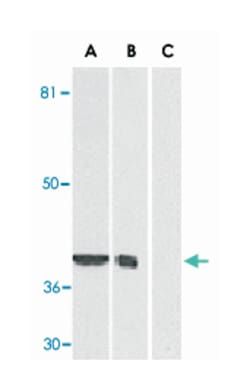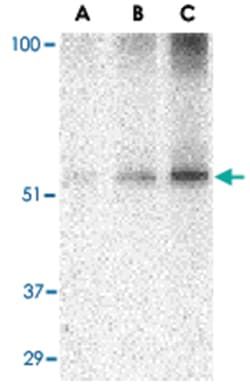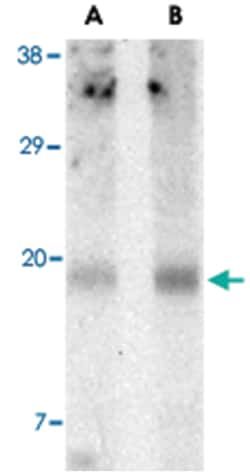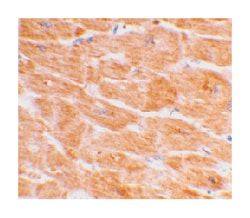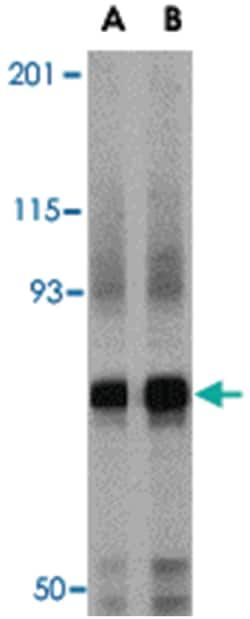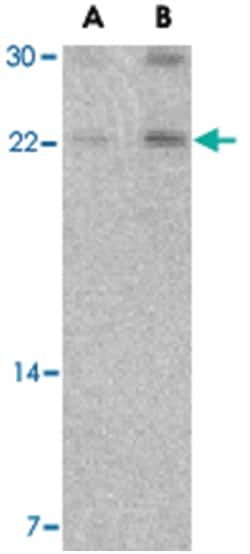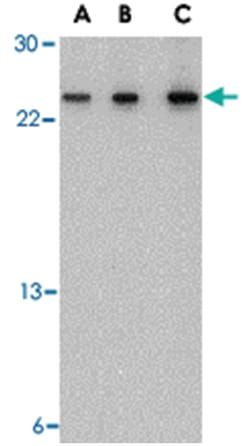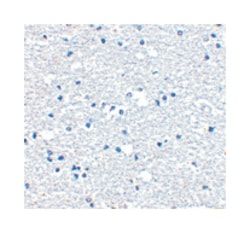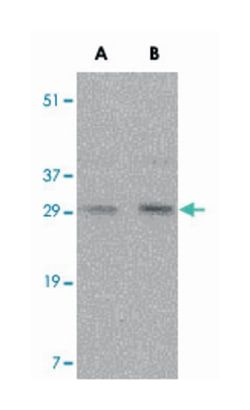89-116-851
TNFSF11 Rabbit anti-Human, Mouse, Rat, Polyclonal Antibody, Abnova™
Manufacturer: Abnova Corporation
Select a Size
| Pack Size | SKU | Availability | Price |
|---|---|---|---|
| Each of 1 | 89-116-851-Each-of-1 | In Stock | ₹ 1,56,462.00 |
89-116-851 - Each of 1
In Stock
Quantity
1
Base Price: ₹ 1,56,462.00
GST (18%): ₹ 28,163.16
Total Price: ₹ 1,84,625.16
Antigen
TNFSF11
Classification
Polyclonal
Description
Rabbit polyclonal antibody raised against synthetic peptide of TNFSF11.
Formulation
In PBS (0.02% sodium azide)
Gene Accession No.
NP_005440
Gene Symbols
TNFSF11
Immunogen
A synthetic peptide corresponding to internal region 14 amino acids of human TNFSF11.
Regulatory Status
RUO
Gene ID (Entrez)
8600
Target Species
Human, Mouse, Rat
Form
Liquid
Applications
Immunohistochemistry (PFA fixed), Western Blot
Conjugate
Unconjugated
Dilution
Western Blot (0.25-0.5 ug/mL) Immunohistochemistry (5 ug/mL) The optimal working dilution should be determined by the end user.
Gene
TNFSF11
Gene Alias
CD254/ODF/OPGL/OPTB2/RANKL/TRANCE/hRANKL2/sOdf
Host Species
Rabbit
Quantity
100 μg
Primary or Secondary
Primary
Test Specificity
Recognizes sRANK Ligand.
Content And Storage
Store at 4°C.
Description
- Description This gene encodes a member of the tumor necrosis factor (TNF) cytokine family which is a ligand for osteoprotegerin and functions as a key factor for osteoclast differentiation and activation
- This protein was shown to be a dentritic cell survival factor and is involved in the regulation of T cell-dependent immune response
- T cell activation was reported to induce expression of this gene and lead to an increase of osteoclastogenesis and bone loss
- This protein was shown to activate antiapoptotic kinase AKT/PKB through a signaling complex involving SRC kinase and tumor necrosis factor receptor-associated factor (TRAF) 6, which indicated this protein may have a role in the regulation of cell apoptosis
- Targeted disruption of the related gene in mice led to severe osteopetrosis and a lack of osteoclasts
- The deficient mice exhibited defects in early differentiation of T and B lymphocytes, and failed to form lobulo-alveolar mammary structures during pregnancy
- Two alternatively spliced transcript variants have been found
- [provided by RefSeq
Compare Similar Items
Show Difference
Antigen: TNFSF11
Classification: Polyclonal
Description: Rabbit polyclonal antibody raised against synthetic peptide of TNFSF11.
Formulation: In PBS (0.02% sodium azide)
Gene Accession No.: NP_005440
Gene Symbols: TNFSF11
Immunogen: A synthetic peptide corresponding to internal region 14 amino acids of human TNFSF11.
Regulatory Status: RUO
Gene ID (Entrez): 8600
Target Species: Human, Mouse, Rat
Form: Liquid
Applications: Immunohistochemistry (PFA fixed), Western Blot
Conjugate: Unconjugated
Dilution: Western Blot (0.25-0.5 ug/mL) Immunohistochemistry (5 ug/mL) The optimal working dilution should be determined by the end user.
Gene: TNFSF11
Gene Alias: CD254/ODF/OPGL/OPTB2/RANKL/TRANCE/hRANKL2/sOdf
Host Species: Rabbit
Quantity: 100 μg
Primary or Secondary: Primary
Test Specificity: Recognizes sRANK Ligand.
Content And Storage: Store at 4°C.
Antigen:
TNFSF11
Classification:
Polyclonal
Description:
Rabbit polyclonal antibody raised against synthetic peptide of TNFSF11.
Formulation:
In PBS (0.02% sodium azide)
Gene Accession No.:
NP_005440
Gene Symbols:
TNFSF11
Immunogen:
A synthetic peptide corresponding to internal region 14 amino acids of human TNFSF11.
Regulatory Status:
RUO
Gene ID (Entrez):
8600
Target Species:
Human, Mouse, Rat
Form:
Liquid
Applications:
Immunohistochemistry (PFA fixed), Western Blot
Conjugate:
Unconjugated
Dilution:
Western Blot (0.25-0.5 ug/mL) Immunohistochemistry (5 ug/mL) The optimal working dilution should be determined by the end user.
Gene:
TNFSF11
Gene Alias:
CD254/ODF/OPGL/OPTB2/RANKL/TRANCE/hRANKL2/sOdf
Host Species:
Rabbit
Quantity:
100 μg
Primary or Secondary:
Primary
Test Specificity:
Recognizes sRANK Ligand.
Content And Storage:
Store at 4°C.
Antigen: PLAU
Classification: Polyclonal
Description: Rabbit polyclonal antibody raised against native PLAU.
Formulation: In 50mM sodium phosphate buffer, 100mM NaCl, 1mM EDTA, pH 6.6
Gene Accession No.: __
Gene Symbols: PLAU
Immunogen: Native purified human PLAU.
Regulatory Status: RUO
Gene ID (Entrez): 5328
Target Species: Human
Form: Liquid
Applications: ELISA, Immunohistochemistry, Western Blot
Conjugate: Unconjugated
Dilution: ELISA (1:10000) Western Blot (1:1000) The optimal working dilution should be determined by the end user.
Gene: PLAU
Gene Alias: ATF/UPA/URK/UROKINASE/u-PA
Host Species: Rabbit
Quantity: 1 mg
Primary or Secondary: Primary
Test Specificity: human Urokinase.
Content And Storage: Store at -80°C.Aliquot to avoid repeated freezing and thawing.
Antigen:
PLAU
Classification:
Polyclonal
Description:
Rabbit polyclonal antibody raised against native PLAU.
Formulation:
In 50mM sodium phosphate buffer, 100mM NaCl, 1mM EDTA, pH 6.6
Gene Accession No.:
__
Gene Symbols:
PLAU
Immunogen:
Native purified human PLAU.
Regulatory Status:
RUO
Gene ID (Entrez):
5328
Target Species:
Human
Form:
Liquid
Applications:
ELISA, Immunohistochemistry, Western Blot
Conjugate:
Unconjugated
Dilution:
ELISA (1:10000) Western Blot (1:1000) The optimal working dilution should be determined by the end user.
Gene:
PLAU
Gene Alias:
ATF/UPA/URK/UROKINASE/u-PA
Host Species:
Rabbit
Quantity:
1 mg
Primary or Secondary:
Primary
Test Specificity:
human Urokinase.
Content And Storage:
Store at -80°C.Aliquot to avoid repeated freezing and thawing.
Antigen: SERPINF1/SERPINF2
Classification: Polyclonal
Description: Rabbit polyclonal antibody raised against SERPINF1/SERPINF2.
Formulation: In 50mM sodium phosphate buffer, 100mM NaCl, 1mM EDTA, pH 6.6
Gene Accession No.: __
Gene Symbols: SERPINF1
Immunogen: Human SERPINF1/SERPINF2.
Regulatory Status: RUO
Gene ID (Entrez): 5176/5345
Target Species: Human
Form: Liquid
Applications: ELISA, Western Blot
Conjugate: Unconjugated
Dilution: ELISA (1:10000) Western Blot (1-5 ug/mL) The optimal working dilution should be determined by the end user.
Gene: __
Gene Alias: EPC-1/PEDF/PIG35
Host Species: Rabbit
Quantity: 1 mg
Primary or Secondary: Primary
Test Specificity: human Alpha 2 Antiplasmin.
Content And Storage: Store at -80°C.Aliquot to avoid repeated freezing and thawing.
Antigen:
SERPINF1/SERPINF2
Classification:
Polyclonal
Description:
Rabbit polyclonal antibody raised against SERPINF1/SERPINF2.
Formulation:
In 50mM sodium phosphate buffer, 100mM NaCl, 1mM EDTA, pH 6.6
Gene Accession No.:
__
Gene Symbols:
SERPINF1
Immunogen:
Human SERPINF1/SERPINF2.
Regulatory Status:
RUO
Gene ID (Entrez):
5176/5345
Target Species:
Human
Form:
Liquid
Applications:
ELISA, Western Blot
Conjugate:
Unconjugated
Dilution:
ELISA (1:10000) Western Blot (1-5 ug/mL) The optimal working dilution should be determined by the end user.
Gene:
__
Gene Alias:
EPC-1/PEDF/PIG35
Host Species:
Rabbit
Quantity:
1 mg
Primary or Secondary:
Primary
Test Specificity:
human Alpha 2 Antiplasmin.
Content And Storage:
Store at -80°C.Aliquot to avoid repeated freezing and thawing.
Antigen: Apoa1
Classification: Polyclonal
Description: Goat polyclonal antibody raised against native Apoa1.
Formulation: In buffer containing 0.09% sodium azide, 100U/mL Penicillin, 10μg/mL Streptomycin, 25ng/mL Amphotericin B.
Gene Accession No.: __
Gene Symbols: Apoa1
Immunogen: Native purified Apoa1 from mouse plasma high density lipoprotein.
Regulatory Status: RUO
Gene ID (Entrez): 11806
Target Species: Mouse, Rat
Form: Liquid
Applications: Radioimmune Assays (RIA)
Conjugate: Unconjugated
Dilution: The optimal working dilution should be determined by the end user.
Gene: Apoa1
Gene Alias: Alp-1/Apoa-1/Brp-14/Ltw-1/Lvtw-1/MGC102525/Sep-1/Sep-2/Sep2
Host Species: Goat
Quantity: 1 mL
Primary or Secondary: Primary
Test Specificity: Recognizes mouse and rat Apo AI. Does not react well with human Apo AI.
Content And Storage: Store at -80°C.Aliquot to avoid repeated freezing and thawing.
Antigen:
Apoa1
Classification:
Polyclonal
Description:
Goat polyclonal antibody raised against native Apoa1.
Formulation:
In buffer containing 0.09% sodium azide, 100U/mL Penicillin, 10μg/mL Streptomycin, 25ng/mL Amphotericin B.
Gene Accession No.:
__
Gene Symbols:
Apoa1
Immunogen:
Native purified Apoa1 from mouse plasma high density lipoprotein.
Regulatory Status:
RUO
Gene ID (Entrez):
11806
Target Species:
Mouse, Rat
Form:
Liquid
Applications:
Radioimmune Assays (RIA)
Conjugate:
Unconjugated
Dilution:
The optimal working dilution should be determined by the end user.
Gene:
Apoa1
Gene Alias:
Alp-1/Apoa-1/Brp-14/Ltw-1/Lvtw-1/MGC102525/Sep-1/Sep-2/Sep2
Host Species:
Goat
Quantity:
1 mL
Primary or Secondary:
Primary
Test Specificity:
Recognizes mouse and rat Apo AI. Does not react well with human Apo AI.
Content And Storage:
Store at -80°C.Aliquot to avoid repeated freezing and thawing.
